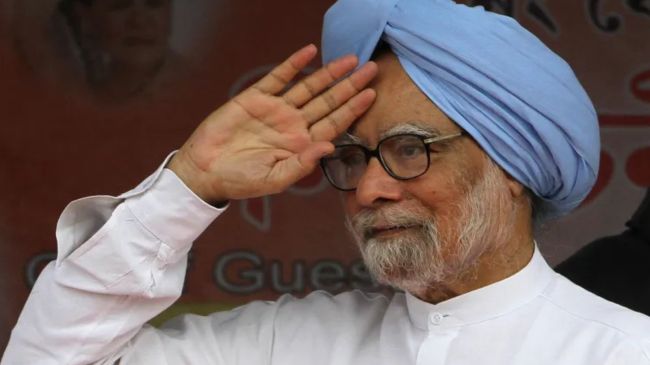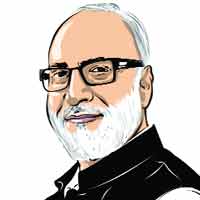Opinion Manmohan Singh to Muhammad Ali, with humility
‘What an amazing level of humility, humanity, and wisdom I found in him’
 After one of such events in Pakistan, I ventured to track down Dr Manmohan Singh’s school in village Gah in Pakistan Punjab. (File photo)
After one of such events in Pakistan, I ventured to track down Dr Manmohan Singh’s school in village Gah in Pakistan Punjab. (File photo) Everyone knows that Dr Manmohan Singh steered India out of a grave economic crisis in 1991, and then performed pretty well, at least on the economic front, during his 10-year tenure as Prime Minister. What many non-economists may not know is that the average annual GDP growth during 2004-05 to 2013-14 was 7.8 per cent (old series), which would be a dream run for any PM. But later on, this was revised downwards to 6.8 per cent (new series) by the NDA government. How much of that was real revision and how much was politics, I leave it to economic statisticians to discuss and debate. I am not going to delve too much into his macro-economic policy hits and misses, but reflect here on my personal interactions with him, and what an amazing level of humility, humanity, and wisdom I found in him.
I was based in Washington D.C. and was working with International Food Policy Research Institute (IFPRI). I initiated a South Asia Initiative (SAI), which had a network of policymakers, academics, and even real farmers. Dr Manmohan Singh had kindly agreed to be a part of this network, and so was Sartaj Aziz from Pakistan. I was holding major events in different countries of South Asia. After one of such events in Pakistan, I ventured to track down Dr Manmohan Singh’s school in village Gah in Pakistan Punjab.
The school principal was kind enough, and he could dig out the certificate and marks sheet of Dr Manmohan Singh when he was in primary school. I took a copy of that. The whole village with about 500 people gathered, and we had several people speaking about Dr Manmohan Singh. One of them was Muhammad Ali, his classmate in primary school. He told me how lucky we were that our prime minister is respected on both sides of the border. Ali was a simple villager and was crying to meet Dr Manmohan Singh. I promised that I will convey his message to Dr Singh whenever I meet him.
I made an album and a video of my visit to village Gah, and how his classmates used to call him ‘Mohny’ in the school. I met Dr Singh at his house over breakfast and presented that album and video, and his marks sheet, and conveyed to him that Muhammad Ali is desperate to meet him. Dr Singh confessed that he does not clearly remember him, his childhood classmate. But I felt relieved that I have conveyed Ali’s message to Dr Singh. And then about 3 months later, I found on the front page of a national daily, a picture of Muhammad Ali embracing Prime Minister Manmohan Singh in PM’s house. This was such a moment of joy for me and I realised the value of childhood friendship. No matter how high you rise in your stature, childhood friendship remains pure and simple, like the bond of Krishna and Sudama.
After a few years, when Dr Singh was in hospital for a heart surgery, I got a call from Pakistan telling me that the whole village of Gah had observed Friday prayers for his well-being and fast recovery. This is the power of humanity.
My own acquaintance with Dr Singh started in 1993, when he was unfolding economic reforms, starting with trade and industrial policies. I did a major paper with Garry Pursell on the need for agriculture reforms, and how to carry out those. That paper became the basis of my first meeting with him, and some reforms he could do in opening up exports of agricultural commodities. Devaluation of Indian rupee made Indian agri-exports very competitive. Rice was a classic example whose exports suddenly zoomed. This led to rising domestic prices, and opposition parties started opposing it. With some halts and hiccups, the journey of agri-exports continued. When he became Prime Minister, agri-exports sky rocketed from USD 8.7 billion in 2003-04 to USD 43.3 billion by 2013-14, a massive jump of almost five-fold. This was the biggest jump India ever witnessed in agri-exports. People don’t realise the benefits it brought about to the farming community and how real wages in the farm sector improved by more than 4 per cent per annum. Thereafter, agri-exports lurched and sputtered, lost steam, and even by 2023-24, it just touched about USD 48.9 billion. And the real wages in agriculture have stagnated for the last 5 years, in fact, marginally declined. May be there are some important lessons to learn, with a quiet mind and humility.
Sir, as you said once, history will be kinder to you… Rest in peace. Om Shanti.
(Gulati is Distinguished Professor at ICRIER. Views are personal)






